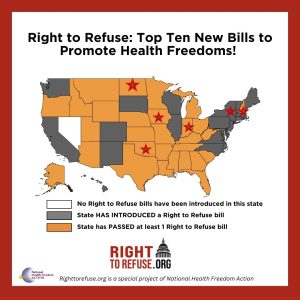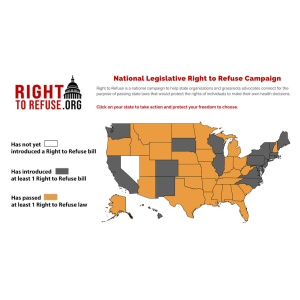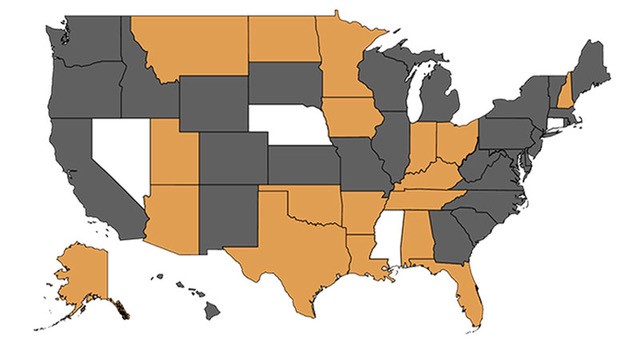
Click the map to see what’s happening
in your state and across the nation.

Just in the past three weeks the Righttorefuse.org team added 56 more bills and three Resolutions to our interactive state map!
Check out what is happening in your state, what organizations are on the ground at your capitol working to protect your medical freedoms, and what bills to support in your state. We are excited to add new bills and resolutions every week to our legislative RighttoRefuse.org state interactive map.
Highlights from the new developments:
First off, three more states have passed right to refuse legislation since legislative sessions ended in May 2021 when we reported that 12 states had right to refuse legislative victories! Here are the latest passages:
Arizona Senate Bill SB1824 provides that the government cannot establish COVID-19 passports or require vaccine status and that employers must accommodate sincerely held religious beliefs against vaccines, along with other features.
Arkansas House Bill HB1977 provides an exemption from employer-mandated COVID-19 vaccination based on a negative test or natural immunity.
Oklahoma Senate Bill SB658 provides that the board of education of a public school district or higher education institutions may not require a COVID-19 vaccine, vaccine passports, or implement a mask mandate for students who have not been vaccinated against COVID-19, along with overall provisions on masking for the board of education of a public school district and a technology center school district.
Secondly, three states have introduced new Resolutions!
A legislative resolution is a statement of intent, an opinion that lawmakers want to emphasize, to demonstrate a consensus on public policy. However, unlike a bill proposal, when a resolution passes it is not an enforceable law.
Alabama House Joint Resolution HJR6 condemns federal executive actions requiring mandatory vaccination of American workers.
California Senate Concurrent Resolution SCR No. 59 urges the legislature to take actions to protect Californians’ right to make their own health and medical decisions, and to take additional actions that reflect the principle that all people are by nature free and independent and have inalienable rights, that citizens should always be given the opportunity to decide to consent, or not to consent, to medical treatments or other interventions without any element of force, fraud, deceit, duress, coercion, undue influence, or disadvantage.
Ohio Senate Resolution No. 204 urges the President of the United States not to allow members of the United States Armed Forces to be punished or reprimanded in any way for refusing to submit to a COVID-19 vaccine.
Thirdly, Common Themes are Emerging to Protect Medical Freedom and Privacy Rights
Among the range of right to refuse bills offered across the nation, the most numerous are bans of COVID-19 passports, prohibitions on discrimination over vaccine status, and creation of vaccine exemptions. Other broader bills supporting the themes of medical freedom and privacy are protection of bodily autonomy, right to consent before medical interventions, and exemptions from mandates in general. Read more about these bills below.
Passports and Discrimination
Nineteen of the 56 new bills introduced explicitly forbid discrimination based on vaccine or immunity status. This anti-discrimination language is important, but other bills that don’t use the word “discrimination” could still potentially create a discrimination claim if they are violated. States with new bills banning discrimination include: Illinois (2 bills), Iowa (2 bills), Michigan, North Carolina, Ohio, Oregon, Texas (9 bills), and West Virginia.
States directly using the term “passport” in their right-to-refuse bills include: Arizona, Kansas, Massachusetts, Michigan (2 bills), North Carolina, Oregon, and Texas. As with the anti-discrimination bills, the use of the term “passport” is not always controlling, e.g., a ban on businesses requiring “proof of vaccination” without using the term “passport” is quite similar to a ban on passports.
Exemptions
Exemptions are a historic and key issue in the health freedom movement’s advocacy for vaccine choice. Broad exemptions from medical interventions or countermeasure requirements help minimize infringements on the rights of citizens to make their own medical decisions. The most common exemptions provided in current vaccine law are medical and religious, with broader exemptions for “conscientiously held beliefs” or “personal beliefs” available in over 15 states.
Examples of current bills seeking broad exemptions include: Iowa (HF330), Michigan (HB4400 and SB82), and Texas (SB 11, SB13, HB109, HB134, and HB155). Bills seeking exemptions specifically from a demand for a negative COVID-19 test or a demand for proof of immunity have been introduced in Arkansas, Michigan, Tennessee, Texas, and West Virginia.
Money
Language tying the availability and use of state and federal funding to Covid mandates and countermeasures has a dynamic influence on citizen activities and freedom. Legislators are responding to this by including bills to explicitly exercise the “power of the purse” in favor of health freedom. Both Kansas (SB159) and Texas (SB36) have bills which would prevent state funds from being spent on COVID-19 passports or enforcement of federal mandates, respectively.
Our Kids
Protection of our children and their rights is paramount to our future. The dominant influence of government and corporations in the lives of children is profoundly impacting their future in numerous ways. Regarding the current issues surrounding Covid-19, bills are coming forward to explicitly protect children: Arizona’s HB2065 provides that no vaccines shall be administered to minors without parental consent; Illinois’ proposed Parental Medical Choice Act (HB4149) provides that minors cannot be forced to accept any medical service or other health-related precaution; and Michigan’s HB5457 holds that students with a prior COVID-19 infection are not required to be vaccinated.
American Lawmaking:
Our 50 states are meant to be American laboratories of lawmaking, with each state free to make laws tailored to the people and culture of their own state and reflective of the Constitution, the law of the land. In the COVID-19 context, this means that the unique activists, legislatures, and pre-existing laws of each state will affect how we work in each state to protect freedom.
We invite you to check out the updated RighttoRefuse.org website to see all of the exciting pending bills and resolutions around the nation and in your state and to support them too, of course!
RECENT NEWS


Video: Hospital Consent Forms and Health Freedom
January 29, 2026

Right to Refuse: Top Ten New Bills to Promote Health Freedoms!
January 22, 2026


